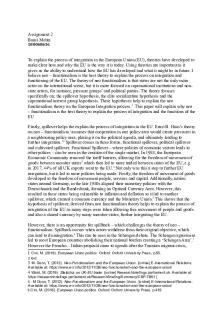Neo Freudians Week 3 PDF

| Title | Neo Freudians Week 3 |
|---|---|
| Author | lmqjp2 lmqjp |
| Course | Theories Of Personality |
| Institution | Regent University |
| Pages | 2 |
| File Size | 63.9 KB |
| File Type | |
| Total Downloads | 77 |
| Total Views | 120 |
Summary
Neo Freudians theory, Personality Perspective Paper
Core characteristics, Core tendency, Peripheral Statement, Development Statement, Ideal Type...
Description
Neo-Freudian is a psychoanalytic theory or group of theories drawn from Freudian concepts and Freud's own theories. This psychoanalytic approach contributed and elaborated on some of the existing notions to personality theory and introduced a new perspective to better understand it. The Neo-Freudians, a group formed of former colleagues, students, and admirers of Sigmund Freud's early theories, drifted apart from his dark, pessimistic, instinctual view of human nature. They expanded on Freud's psychoanalysis by incorporating the social and cultural elements that shape human personality, something Freud had failed to do while omitting the sexual motivations. Erik Erikson, Alfred Adler, Karen Horney, and Carl Jung were some of the psychoanalysts/psychologists who became known as Neo-Freudians (Burger, 2018, pp. 82-83). Although Neo-Freudians derived from Freud's theory, they differed significantly. NeoFreudians claimed that not only the early childhood experiences, but also social and cultural interactions influenced the development of personality; this can be considered their core tendency. The constructive functions of the ego, the conscious more so than the unconscious, defense mechanisms, and dream interpretation stand for their core characteristics. Neo-Freudians identified the role social factors play in the formation and change of personality; this claim forms their peripheral statement. While the development statement is subject to the personality's development over the person's lifespan, influenced by their social and cultural interactions. NeoFreudians' ideal type is overcoming psychosocial experiences and the satisfaction obtained from reaching full potential (Burger). This perspective can clearly be seen in Erik Erikson's Stages of Personality Development. Eight psychosocial stages throughout the lifespan and an ego-given sense of identity allow for the individual's personality development; each represents a conflict and two solutions. Erikson's theory emphasized the social relationships that are important at each stage. A well-adapted and integrous personality depend on the successful completion of each task (Burger, pp. 92-93). In his theory of Striving for superiority, Alfred Adler identified three fundamental social tasks that everyone must experience: occupational, social, and love, along with overcoming the feeling of worthlessness that does not live up to social standards. Human nature longs for mutual connectedness and the common welfare, which inspired Adler's statement "Gemeinschaftsgefuhl or social interest." It is only then that superiority is achieved (Burger, p. 85). Karen Horney's Neurotic Coping Styles Theory's main focus was the role of unconscious anxiety. She claimed that childhood experiences, and unmet needs due to unhealthy parenting, led to basic anxiety and abnormal development. Horney suggested three main coping styles, moving toward people, moving away from people, and moving against people. She believed mentally healthy people occasionally used each of the three to stir away from anxiety (Burger, p. 98-99). In turn, Carl Jung's Collective Unconscious Theory claimed that the collective unconscious is a shared version of the personal unconscious. According to Jung, it held patterns, memories, and experiences common to everyone around the world. He claimed these archetypes, such as the anima, the animus, and the shadow passed down through generations cross-culturally, are characterized by symbols depicted in art, literature, folklore, and dreams. Jung agreed on the
difficulty of bringing these archetypes into awareness. Jung relied on unconventional research methods like mythology, cultural symbols, dreams, and schizophrenic patients to prove his theory (Burger, pp. 88-91). Apart from their socially driven concepts and their optimistic view of human personality, Neo-Freudians were criticized for being philosophical, mythical, and constructing their theories on patient-given information; their influence on today's psychoanalysis was significant (Burger, p.106)....
Similar Free PDFs

Neo Freudians Week 3
- 2 Pages

Stati Neo Ittiti Neo siriani
- 16 Pages

In Week 3 - Week 3
- 1 Pages

Week 3 key - Week 3 worksheet
- 7 Pages

Week 3 - Lecture notes week 3
- 11 Pages

Week 3 - Discussion for Week 3
- 2 Pages

Mazhab Neo Klasik
- 1 Pages

HULL-NEO- Conductismo
- 3 Pages

Manual dsc neo hsm2host9
- 21 Pages

Neo Aristotelian Criticism
- 3 Pages
Popular Institutions
- Tinajero National High School - Annex
- Politeknik Caltex Riau
- Yokohama City University
- SGT University
- University of Al-Qadisiyah
- Divine Word College of Vigan
- Techniek College Rotterdam
- Universidade de Santiago
- Universiti Teknologi MARA Cawangan Johor Kampus Pasir Gudang
- Poltekkes Kemenkes Yogyakarta
- Baguio City National High School
- Colegio san marcos
- preparatoria uno
- Centro de Bachillerato Tecnológico Industrial y de Servicios No. 107
- Dalian Maritime University
- Quang Trung Secondary School
- Colegio Tecnológico en Informática
- Corporación Regional de Educación Superior
- Grupo CEDVA
- Dar Al Uloom University
- Centro de Estudios Preuniversitarios de la Universidad Nacional de Ingeniería
- 上智大学
- Aakash International School, Nuna Majara
- San Felipe Neri Catholic School
- Kang Chiao International School - New Taipei City
- Misamis Occidental National High School
- Institución Educativa Escuela Normal Juan Ladrilleros
- Kolehiyo ng Pantukan
- Batanes State College
- Instituto Continental
- Sekolah Menengah Kejuruan Kesehatan Kaltara (Tarakan)
- Colegio de La Inmaculada Concepcion - Cebu





